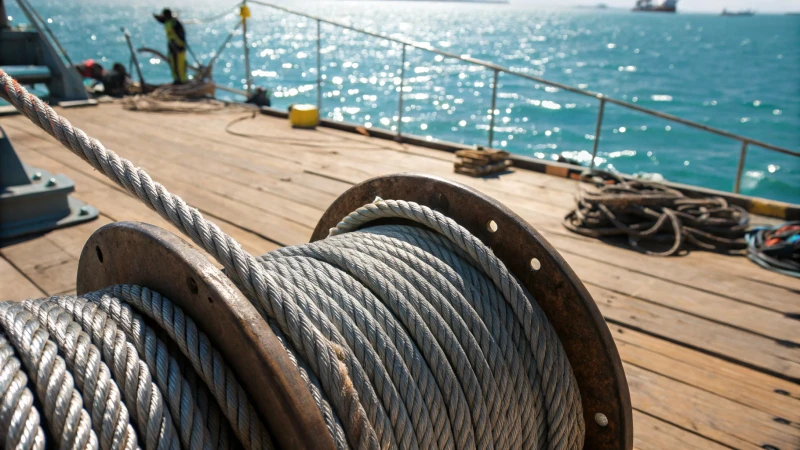
Ever wondered why steel wire ropes are the go-to choice for marine construction?
Corrosion-resistant steel wire ropes are essential in marine construction because they withstand the unforgiving saltwater environment, minimizing maintenance and enhancing safety and durability.
Imagine you're out on a construction project by the sea. The air is salty, the waves are relentless, and every piece of equipment faces constant assault from the elements. It's in these moments that I truly appreciate corrosion-resistant steel wire ropes. These ropes aren't just strong; they're like trusty old friends—reliable and steadfast. They battle against the harsh marine conditions, ensuring that our projects not only stay on track but also stand the test of time. Their superior tensile strength and fatigue resistance make them indispensable, reducing the frequency of replacements and maintenance—a real game-changer when deadlines loom large.
Corrosion-resistant ropes last longer in marine environments.True
These ropes are designed to withstand harsh saltwater, reducing wear.
Corrosion-resistant steel ropes require frequent maintenance.False
Their design minimizes maintenance needs, enhancing project efficiency.
How Do Corrosion-Resistant Coatings Enhance Steel Wire Ropes?
When I first discovered the magic of corrosion-resistant coatings, I felt like I'd stumbled upon a secret weapon for steel wire ropes in tough environments.
Corrosion-resistant coatings on steel wire ropes create a protective barrier against harsh environmental elements like moisture and chemicals. This not only boosts their durability but also minimizes maintenance needs and extends their lifespan, which is vital for industries such as construction and marine.
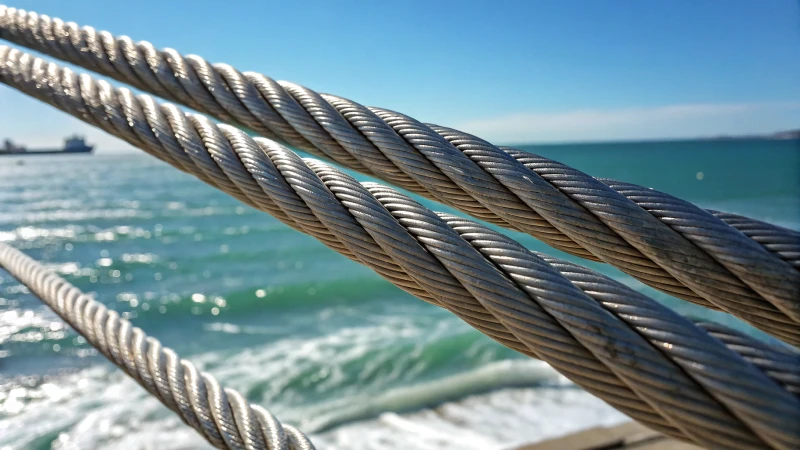
The Science Behind Corrosion-Resistant Coatings
Corrosion-resistant coatings provide a shield that prevents oxidative reactions on the surface of steel wire ropes. By blocking exposure to moisture and chemicals1, these coatings slow down rust formation, which is a common issue in marine environments.
I remember the first time I really grasped how these coatings work. It was during a project involving marine construction. The challenge was real—constant exposure to saltwater was wreaking havoc on our equipment. Then, I learned about these coatings that act like invisible shields, blocking moisture and chemicals. Suddenly, the rust that seemed inevitable was slowed down dramatically, extending the life of our ropes.
Types of Corrosion-Resistant Coatings
-
Galvanization: Picture this—your steel wire ropes wrapped in a protective layer of zinc. Even when the coating gets nicked, zinc takes the hit to protect the steel beneath. It's like having a safety net for your ropes in construction or mining.
-
Polymeric Coatings: These are like the raincoats of the wire rope world. Made from PVC or nylon, they keep moisture out and are perfect for humid or chemical-heavy environments.
| Coating Type | Benefits | Common Applications |
|---|---|---|
| Galvanization | High rust resistance | Construction, Mining |
| Polymeric | Moisture barrier, Chemical resistance | Marine, Chemical Processing |
Advantages in Various Industries
For industries like construction and marine2, corrosion-resistant coatings can drastically reduce downtime caused by rope failures. For instance, marine-grade ropes with high-performance coatings have shown up to 30% reduction in maintenance intervals.
I once worked on a construction project where we were constantly fighting against downtime due to rope failures. Switching to marine-grade ropes with advanced coatings was a game-changer. We cut down maintenance by 30% and kept our project timeline intact.
How to Choose the Right Coating
When selecting a coating, consider the specific environmental conditions where the ropes will be used. Factors such as salinity, humidity, and exposure to chemicals should guide your choice. Consulting with suppliers who understand these nuances can be beneficial.
Selecting the right coating is a bit like choosing the right gear for a mountain hike—it's all about knowing your environment. If you're working somewhere with high salinity or humidity or dealing with harsh chemicals, you'll want to pick a coating that can handle those specific challenges. I found it invaluable to chat with suppliers who really understood these nuances—they helped me make informed decisions that saved us time and money.
By incorporating these advanced coatings into their operations, industries not only boost efficiency and safety but also ensure their operations run smoothly without unexpected hiccups, keeping everyone happy and productive.
Corrosion-resistant coatings prevent rust on steel wire ropes.True
Coatings block moisture and chemicals, slowing rust formation.
Polymeric coatings are ineffective in chemical environments.False
Polymeric coatings resist moisture and chemicals effectively.
What Are the Key Performance Metrics for Marine Wire Ropes?
Ever been out at sea, feeling the salty breeze and wondering about the ropes keeping everything secure?
Key performance metrics for marine wire ropes include tensile strength, fatigue resistance, corrosion resistance, and flexibility. These ensure the ropes can withstand the harsh marine environment, supporting both safety and operational efficiency.
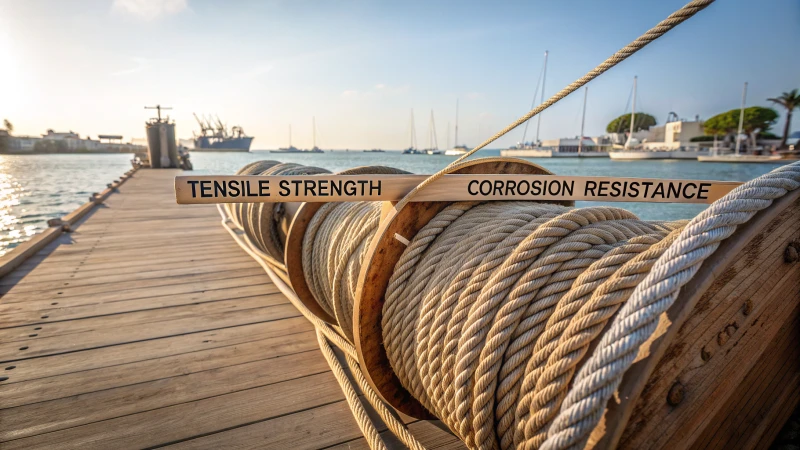
Understanding Tensile Strength
Tensile strength is the backbone of any good marine rope. It’s like that time when I first tried lifting weights—learning how much stress my body could handle before I’d have to call it quits. For marine wire ropes, this metric tells us how much weight they can bear before they give in. Imagine needing to hoist a massive load onboard; selecting a rope with the right tensile strength can mean the difference between a smooth operation and a chaotic mishap.
The Role of Fatigue Resistance
Fatigue resistance reminds me of running a marathon. It’s not just about endurance but how well I can handle repetitive stress without giving up halfway through. Marine environments are all about constant motion, so these ropes need to be tough. Picture a crane at the docks, always lifting, moving, swinging back and forth—ropes built with superior fatigue resistance help keep things steady, no matter how relentless the waves.
Importance of Corrosion Resistance
Ah, the dreaded rust! I remember leaving my bike out in the rain once—it wasn’t pretty. Marine wire ropes face similar challenges with saltwater exposure. Good corrosion resistance is essential to extend their life. Ropes with top-notch coatings can save you time and hassle by reducing maintenance needs by a significant 30% impacting project timelines3.
| Metric | Description |
|---|---|
| Tensile Strength | Maximum load-bearing capacity before breaking |
| Fatigue Resistance | Ability to withstand repeated stress cycles |
| Corrosion Resistance | Durability against saltwater-induced degradation |
Evaluating Flexibility
Flexibility is what makes these ropes adaptable, like my yoga instructor always says about keeping joints limber. In operations where you’re constantly bending and twisting, flexible ropes are lifesavers. They’re easier to manage and handle stresses better, which is why fishermen rely on them to handle nets smoothly.
By grasping these metrics, folks like John or Raj can make informed decisions, ensuring they pick ropes that truly meet their needs. Whether it’s about hoisting heavy loads or battling against the elements, choosing the right rope is crucial for safety and efficiency.
Tensile strength indicates load capacity of marine ropes.True
Tensile strength measures the maximum stress a wire rope can endure before failure.
Galvanization decreases corrosion resistance in marine ropes.False
Galvanization enhances corrosion resistance by protecting against saltwater exposure.
How does corrosion resistance impact maintenance schedules?
Ever felt like your maintenance schedule was a never-ending treadmill? Corrosion resistance might just be the game-changer you need.
Corrosion resistance can dramatically streamline maintenance schedules by reducing repair frequency and prolonging equipment life. This is particularly beneficial in environments prone to corrosion, minimizing downtime and cutting operational costs.
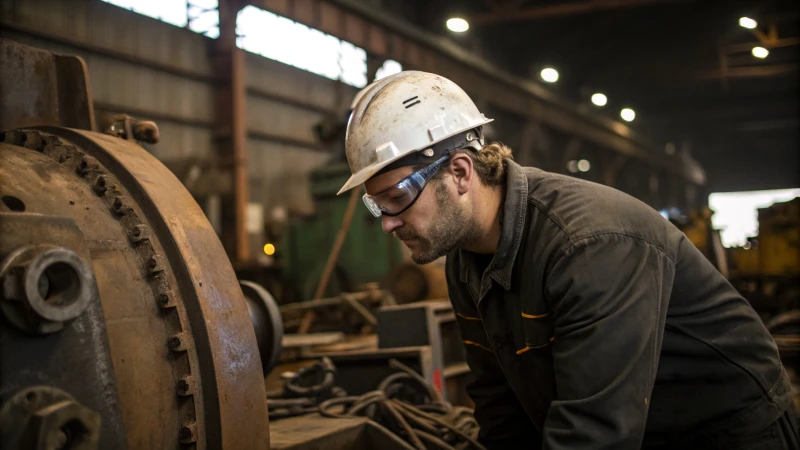
Understanding Corrosion Resistance
I remember my first encounter with the power of corrosion resistance in steel wire ropes during a particularly demanding marine construction project. It was an eye-opener to see how certain materials bravely stood their ground against the relentless attack of saltwater and oxidation, maintaining their strength and integrity when others quickly succumbed.
Corrosion resistance refers to a material's ability to withstand damage caused by oxidization or other chemical reactions. In the context of steel wire ropes, especially in marine environments4, corrosion resistance is vital to maintaining structural integrity.
Factors Affecting Maintenance
-
Material Composition: The difference in maintenance needs between regular steel and stainless steel ropes was like night and day. Stainless steel ropes not only stood the test of time but also saved us numerous inspection and replacement cycles. Materials with higher corrosion resistance require less frequent inspections and replacements.
-
Environmental Conditions: I learned the hard way that saltwater and humidity are not to be underestimated. Coated ropes became our heroes, reducing our maintenance by a whopping 30%, as studies had promised. These little victories against nature’s harshness kept our projects on track. The presence of saltwater, humidity, and temperature fluctuations accelerates corrosion.
Implementing corrosion-resistant coatings can mitigate these effects, as evidenced in studies showing a 30% reduction in maintenance for coated ropes.
Cost-Benefit Analysis
| Factor | Regular Ropes | Corrosion-Resistant Ropes |
|---|---|---|
| Initial Cost | Lower | Higher |
| Maintenance Cost | Higher | Lower |
| Lifespan | Shorter | Longer |
While initial costs for corrosion-resistant materials might pinch your budget a bit more, the long-term savings in maintenance were undeniable for us. Fewer replacements meant more time focusing on project milestones rather than scrambling for quick fixes.
Investing in corrosion-resistant materials may have a higher initial cost but results in lower long-term maintenance expenses. The reduced need for frequent replacements and repairs saves both time and resources.
Practical Implications in Industries
For procurement managers like John and Emma, prioritizing corrosion-resistant materials not only aligned with their goals of reliability and safety but also eased their daily operations. Prioritizing these materials can align with objectives of reliability and compliance with safety standards5.
I found that understanding these materials’ impact on maintenance schedules empowered us to make more informed purchasing decisions.
By diving into the relationship between corrosion and maintenance schedules, I realized that industries could significantly optimize operations, reducing downtime, and enhancing equipment reliability by choosing the right materials and coatings.
Corrosion-resistant ropes reduce maintenance costs by 30%.True
Studies show coated ropes reduce maintenance by 30% in corrosive settings.
Stainless steel ropes require more frequent inspections.False
Stainless steel has superior corrosion resistance, reducing inspection frequency.
Why Choose Corrosion-Resistant Steel Ropes Over Alternatives?
Imagine being on a construction site where every piece of equipment withstands the test of time and harsh conditions. That's the promise of corrosion-resistant steel ropes.
Corrosion-resistant steel ropes stand out with their unmatched durability, requiring less maintenance and offering superior longevity in challenging environments. Their advanced coatings ensure safety and reliability, making them the go-to choice for demanding industries.
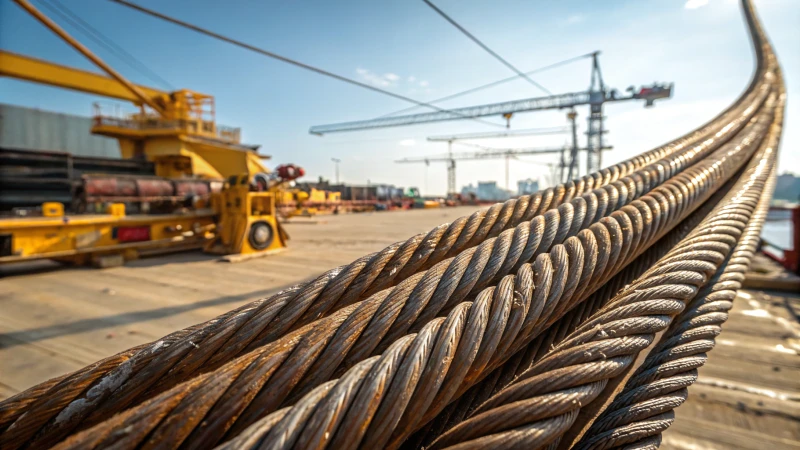
Understanding the Importance of Corrosion Resistance
I remember a time when I was overseeing a marine project and the ropes we used just couldn't stand up to the relentless saltwater. They corroded faster than expected, leading to unexpected downtime and repairs. That's when I learned the true value of corrosion-resistant steel ropes. These ropes are engineered to endure harsh conditions, whether it's in marine environments6 or intense industrial settings. They combat moisture, chemicals, and extreme temperatures, reducing the risk of failures significantly.
Material Benefits and Coatings
The first time I switched to high-quality stainless steel ropes with specialized coatings, it was like night and day compared to traditional ropes. These coatings, such as zinc or polymer, are game-changers. They offer extraordinary protection against environmental wear and tear.
| Coating Type | Benefit |
|---|---|
| Zinc | Protects against rust and weather damage |
| Polymer | Provides a barrier against chemicals |
This transition not only extended the lifespan of our equipment but also reduced the frequency of replacements, leading to significant cost savings.
Cost-Effectiveness Over Time
Initially, I was skeptical about the higher upfront cost of corrosion-resistant ropes. But when I considered the long-term savings — cutting down maintenance intervals by up to 30% — it was clear they were worth every penny. This not only saved money but also helped maintain project efficiency7, minimizing downtime.
Enhanced Safety and Performance
Safety is always at the forefront of my mind in any operation. I've seen firsthand how these ropes excel in sectors like construction, mining, and marine operations. Their superior tensile strength and fatigue resistance mean they perform consistently under heavy loads and extreme conditions. This is crucial in preventing accidents caused by rope failures.
With all these benefits in mind, it's clear why procurement officers and project managers should consider corrosion-resistant steel ropes. Whether you're involved in construction8, mining, or other demanding fields, these ropes offer a reliable solution that meets stringent safety standards.
Corrosion-resistant ropes reduce maintenance by 30%.True
Corrosion-resistant ropes cut maintenance needs by up to 30%, saving costs.
Polymer coatings do not protect against chemicals.False
Polymer coatings provide a barrier against chemical damage, enhancing durability.
Conclusion
Corrosion-resistant steel wire ropes are essential for marine construction, offering durability, reduced maintenance, and enhanced safety against harsh saltwater environments, making them a reliable choice for demanding industries.
-
Understanding how moisture and chemicals affect steel wire ropes can help in choosing appropriate protective measures. ↩
-
Exploring applications in these industries can reveal practical benefits of using corrosion-resistant coatings. ↩
-
Discover how advanced coatings improve corrosion resistance, extending the lifespan of marine wire ropes and reducing maintenance costs. ↩
-
Learn about how marine environments accelerate corrosion and the importance of using resistant materials. ↩
-
Understand the safety standards that guide corrosion-resistant material usage in industrial applications. ↩
-
Explore how marine environments impact materials and discover corrosion-resistant solutions to enhance longevity. ↩
-
Learn how using corrosion-resistant materials can streamline project timelines and reduce costs. ↩
-
Understand the safety standards for steel ropes in construction to ensure compliance and safety. ↩

